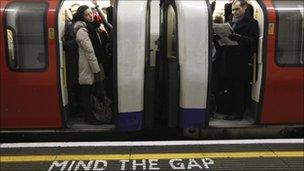London 2012: Support 'high' despite 'unfair' ticketing
- Published
About 57% of Londoners feel the ticketing procedure for the 2012 Olympics was "not fair" but this has not dented support for the event, a survey found.
Of the 1,000 people surveyed, 73% backed London hosting the Games, with 38% saying they felt "more positive" about the event now than in 2010.
Almost seven out of 10 people said the event would benefit east London, the economy and improve sports facilities.
But 52% people felt London's transport system would not be able to cope.
The BBC London-commissioned survey by Ipsos MORI involved interviews with 1,000 adults, by telephone, between 8 and 13 July.
It was conducted after the results of the second ballot for tickets came through.
'Avoid the Olympics'
About 31% bid for tickets in the first round, of which 2% got all their tickets but 67% were left empty-handed.
Of those people who got some or none of the tickets in the first round, 31% tried their luck for a second time, but again more than half of them did not get any tickets.
Following the two ballots, 57% said they felt the process was "not fair".
But across the capital, support for the the Games has risen from 69% in 2006, a year after London won the bid to host the Olympics, remaining constant at 73% in 2010 and 2011.
About 65% of people said they were "very or fairly excited" about the Games, with the level of enthusiasm highest in the 18 to 34 age group.
Olympics minister Hugh Robertson said: "There were 22 million applications and 6.5 million tickets and that means for more popular events there are going to be a lot of disappointed people. I understand their disappointment but I can't see a way around it."
He added the high levels of support for the Games did not come as a surprise.
"I think its going to be one of those great national moments.
"We are under budget and ahead of time and as a nation we have a reputation of really getting behind these big events," Mr Robertson said.
But the capital was split on the question of whether the event delivered value for money.
'Modify' daily commute
On the capital's transport, 55% felt in 2010 that the system would not be able to cope with the pressure of handling tens of thousands of visitors during the Games fortnight. That figure stands at 52% this year.
But almost seven out of 10 commuters said they would not change their daily travel plans just for the Games, although TfL are hoping for a 30% drop in commuters.
Mark Evers, TfL's director of Games Transport, said: "We are working very closely with London's businesses, and as we get close to the Games with London's residents as well, in order to help them to understand how London's transport network would be different come Games time and that for some it might include changing the way they get to and from work."
He added the transport system would be able to cope with the added pressure as Londoners would "also recognise that London will be busier than what is normally and as a result they will modify their transport behaviour".
Businesses in the capital also echoed the concerns about the impact of transport disruptions, a survey of 160 firms by the London Chamber of Commerce (LCC) showed.
Peter Bishop, deputy chief executive of LCC, said the Games presented a "great opportunity" to generate new business.

Half the people feel London's transport will not be able to cope with the Games
"With one year to go efforts must now be redoubled to ensure that every London business is prepared for travel disruption," he said.
TfL said at least 200 firms, employing more than 370,000 people, had already signed up for travel advice sessions.
About one in five Londoners said they planned to leave the city during the Olympics, with 47% of those saying they wanted "to avoid the Olympics".
The survey also found that just under half the people interviewed hardly knew anything about the Cultural Olympiad - a series of cultural events that have been taking place across the country until the Games.
But Ruth McKenzie, director of the Cultural Olympiad, said she was not "discouraged".
She added: "We haven't started our marketing, we haven't gone on sale, we haven't launched our website yet and yet 51% of people know what it is."
The survey suggested that despite scepticism people in the capital were beginning to see the benefits of Games, and 67% felt London's mayor and the government were doing a "fairly good job" in preparing for the event.
About seven out of 10 people said the regeneration of east London and the benefits to the economy justified the money being spent on the Olympics, while more than 60% felt the Games would boost tourism, improve sport facilities and increase jobs and was "good for Britain generally".
- Published25 July 2011
- Published24 July 2011
- Published21 July 2011
- Published12 July 2011